海淀区2014高二下学期英语期中考试试题及答案
- 格式:doc
- 大小:1.15 MB
- 文档页数:14
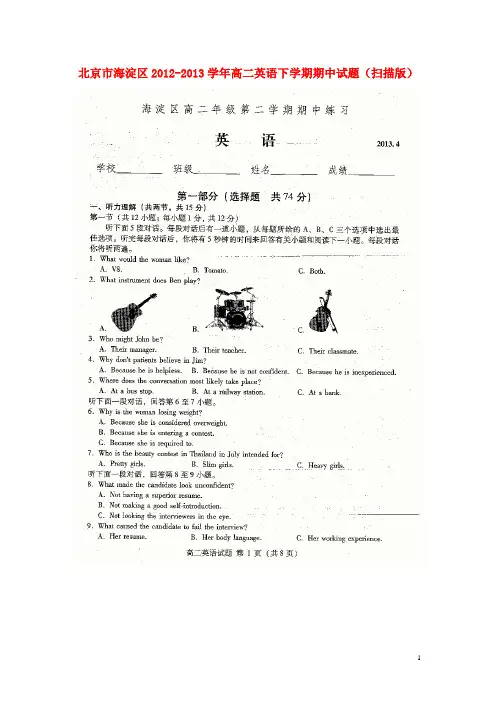
北京市海淀区2012-2013学年高二英语下学期期中试题(扫描版)海淀区高二年级第二学期期中练习英语2013.04参考答案第一部分(选择题共74分)一、听力理解第一节(共12小题;每小题1分,共12分)1. A2. A3. B4. C5. B6. B7. C8. C9. B 10. B11. A 12. C二、单项填空(共10小题;每小题1分,共10分)13. C 14. B 15. D 16. B 17. A 18. D 19. C 20. B 21.A 22. C三、完形填空(共20小题;每小题1分,共20分)23. B 24. C 25. A 26. A 27. D 28. C 29. B 30. D 31. C32. A33. D 34. D 35. C 36. B 37. C 38. A 39. A 40. B 41. B 42. D四、阅读理解(共16小题;每小题2分,共32分)43. B 44. C 45. C 46. B 47. A 48. A 49. D 50. C51. A 52. B53. C 54. D 55. E 56. A 57.B 58. D第二部分(非选择题共26分)一、听力理解第二节(共3小题; 每小题1分, 共3分)1. Mason2. cough3. Tuesday注:★每小题超过一个词不得分;★拼写、大小写错误、星期缩写不得分。
二、完成句子(共4小题;每小题2分,共8分)1. adapted to/adjusted to/…2. be aware of/realize/…3. dedicated/committed/devoted to improving/…4. By the end of the century注:表达达意酌情给分。
三、书面表达(15分)Possible version 1Last Monday afternoon, we had an activity of Sino-America cultural exchange in our classroom.At 1:30, when the American friends came to our class, all of us stood up and clapped our hands to welcome them. Shortly afterwards, I introduced our important festival—the Spring Festival to them while an American friend shared the knowledge of Christmas. After that, we showed them how to make paper cuts and taught them some Chinese charact ers, such as “节日”(festival). In the end, we exchanged gifts and had a group photo taken to mark the memorable occasion.Through this activity, we not only learned some culture from each other but also promoted our understanding and friendship. I hope we can have more of these in the future.(一)、评分原则:1.本题总分为15分,按4个档次给分。
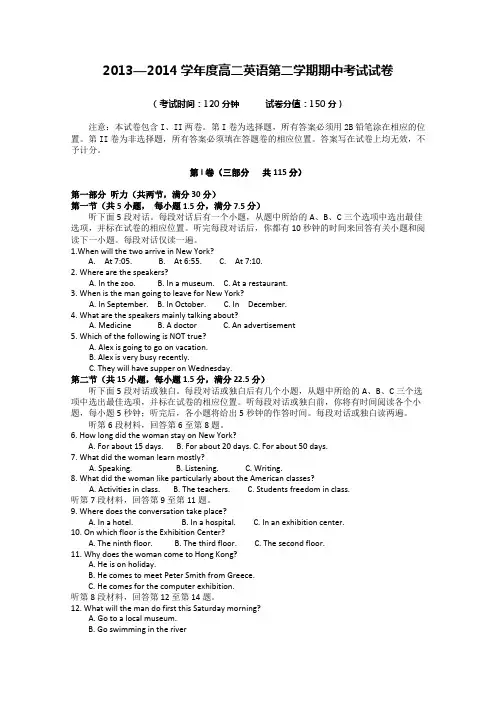
2013—2014学年度高二英语第二学期期中考试试卷(考试时间:120分钟试卷分值:150分)注意:本试卷包含I、II两卷。
第I卷为选择题,所有答案必须用2B铅笔涂在相应的位置。
第II卷为非选择题,所有答案必须填在答题卷的相应位置。
答案写在试卷上均无效,不予计分。
第I卷(三部分共115分)第一部分听力(共两节,满分30分)第一节(共5小题,每小题1.5分,满分7.5分)听下面5段对话。
每段对话后有一个小题,从题中所给的A、B、C三个选项中选出最佳选项,并标在试卷的相应位置。
听完每段对话后,你都有10秒钟的时间来回答有关小题和阅读下一小题。
每段对话仅读一遍。
1.When will the two arrive in New York?A. At 7:05.B. At 6:55.C. At 7:10.2. Where are the speakers?A. In the zoo.B. In a museum.C. At a restaurant.3. When is the man going to leave for New York?A. In September.B. In October.C. In December.4. What are the speakers mainly talking about?A. MedicineB. A doctorC. An advertisement5. Which of the following is NOT true?A. Alex is going to go on vacation.B. Alex is very busy recently.C. They will have supper on Wednesday.第二节(共15小题,每小题1.5分,满分22.5分)听下面5段对话或独白。
每段对话或独白后有几个小题,从题中所给的A、B、C三个选项中选出最佳选项,并标在试卷的相应位置。
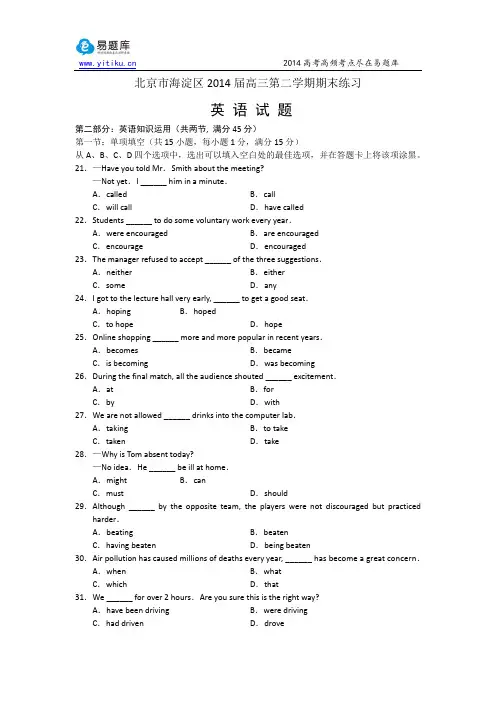
北京市海淀区2014届高三第二学期期末练习英语试题第二部分:英语知识运用(共两节, 满分45分)第一节:单项填空(共15小题,每小题1分,满分15分)从A、B、C、D四个选项中,选出可以填入空白处的最佳选项,并在答题卡上将该项涂黑。
21.—Have you told Mr.Smith about the meeting?—Not yet.I ______ him in a minute.A.called B.callC.will call D.have called22.Students ______ to do some voluntary work every year.A.were encouraged B.are encouragedC.encourage D.encouraged23.The manager refused to accept ______ of the three suggestions.A.neither B.eitherC.some D.any24.I got to the lecture hall very early, ______ to get a good seat.A.hoping B.hopedC.to hope D.hope25.Online shopping ______ more and more popular in recent years.A.becomes B.becameC.is becoming D.was becoming26.During the final match, all the audience shouted ______ excitement.A.at B.forC.by D.with27.We are not allowed ______ drinks into the computer lab.A.taking B.to takeC.taken D.take28.—Why is Tom absent today?—No idea.He ______ be ill at home.A.might B.canC.must D.should29.Although ______ by the opposite team, the players were not discouraged but practiced harder.A.beating B.beatenC.having beaten D.being beaten30.Air pollution has caused millions of deaths every year, ______ has become a great concern.A.when B.whatC.which D.that31.We ______ for over 2 hours.Are you sure this is the right way?A.have been driving B.were drivingC.had driven D.drove32.Success partly depends on ______ you have the patience to do simple things perfectly.A.that B.whatC.when D.whether33.If I ______ the project earlier, I would be enjoying myself on the beach now.A.might finish B.finishedC.had finished D.would have finished34.______ is responsible for the accident will be punished.A.Whoever B.WhateverC.Who D.What35.You can get respect from others only ______ you respect yourself.A.because B.whenC.before D.unless第二节完型填空(共20小题;每小题1.5分,满分30分)阅读下面短文,从短文后各题所给的四个选项(A、B、C和D)中,选出最佳选项,并在答题卡上涂黑。
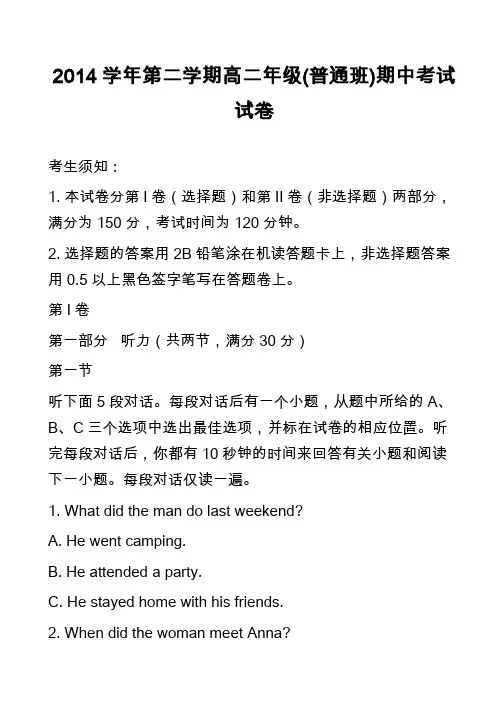
2014学年第二学期高二年级(普通班)期中考试试卷考生须知:1. 本试卷分第I卷(选择题)和第II卷(非选择题)两部分,满分为150分,考试时间为120分钟。
2. 选择题的答案用2B铅笔涂在机读答题卡上,非选择题答案用0.5以上黑色签字笔写在答题卷上。
第I卷第一部分听力(共两节,满分30分)第一节听下面5段对话。
每段对话后有一个小题,从题中所给的A、B、C三个选项中选出最佳选项,并标在试卷的相应位置。
听完每段对话后,你都有10秒钟的时间来回答有关小题和阅读下一小题。
每段对话仅读一遍。
1. What did the man do last weekend?A. He went camping.B. He attended a party.C. He stayed home with his friends.2. When did the woman meet Anna?A. At 7:55.B. At 7:58.C. At 8:02.3. Why does the woman remember James so well?A. He has a funny face.B. He was the first person she met at school.C. He was late for school on the first day.4. What do we know about the man?A. He is eager to meet the boss.B. He is going to give a talk on fishing.C. He has the same hobby as the boss.5. What does the woman mean?A. Bob never studies hard.B. Bob has been studying hard lately.C. Bob started preparing for the test long ago.第二节听下面5段对话或独白。
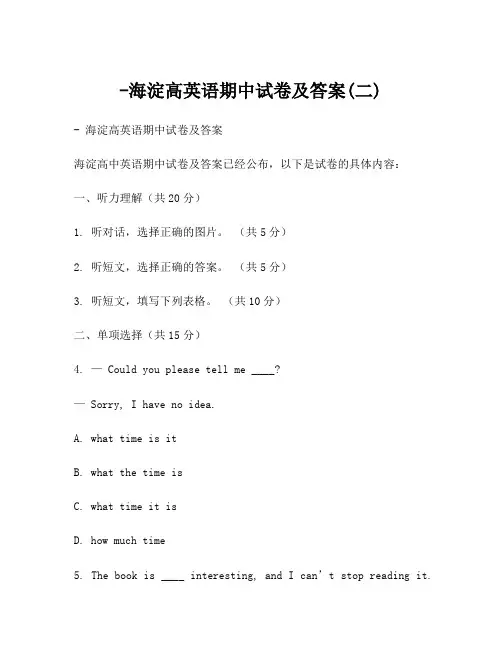
-海淀高英语期中试卷及答案(二)- 海淀高英语期中试卷及答案海淀高中英语期中试卷及答案已经公布,以下是试卷的具体内容:一、听力理解(共20分)1. 听对话,选择正确的图片。
(共5分)2. 听短文,选择正确的答案。
(共5分)3. 听短文,填写下列表格。
(共10分)二、单项选择(共15分)4. — Could you please tell me ____?— Sorry, I have no idea.A. what time is itB. what the time isC. what time it isD. how much time5. The book is ____ interesting, and I can’t stop reading it.A. soB. suchC. tooD. very6. — Can you help me with the math problem?— Sure. ____.A. I have no ideaB. It’s none of my businessC. That’s all rightD. I’d be glad to7. The teacher asked the students ____ the classroom.A. cleanB. cleanedC. to cleanD. cleaning8. —I’m afraid I can’t finish the report on time.— ____.A. That’s rightB. Take your timeC. You’d better h urry upD. No problem9. ____ the bad weather, we decided to cancel the picnic.A. BecauseB. AlthoughC. ThereforeD. However10. — Do you like the new dress?—Yes, it’s ____. I’m going to wear it to the party.A. expensiveB. beautifulC. comfortableD. fashionable三、完形填空(共20分)11. I have a friend named Tom. He is a very 12 boy. He is always 13 to help others. He never says no to his friends. If his friends have any problems, he is always there to 14 them. Tom is not only helpful, but also very 15 . He is very good at sports. He plays basketball and football very well. He often 16 his classmates to play basketball after school. He is also good at singing. He often sings in the school choir. Many students like to listen to him sing. Tom is a very 17 student. He always studies hard and gets good grades. He never wastes his time 18 TV or playing games. He knows that studying is very important for his future. Tom is a very good friend. I’m 19 to have him as my friend.12. A. lazyB. kindC. meanD. rude13. A. willingB. afraidC. happyD. angry14. A. helpB. hurtC. ignoreD. hate15. A. strongB. smartC. friendlyD. funny16. A. teachesB. asksC. invitesD. tells17. A. lazyB. poorC. hardworkingD. rude18. A. watchingB. playingC. listeningD. reading19. A. happyB. sorryC. angryD. afraid四、阅读理解(共30分)A20. What is the passage mainly about?A. The benefits of reading.B. The importance of reading.C. The history of reading.D. The types of reading.21. What is the first benefit of reading?A. It can improve your vocabulary.B. It can help you relax.C. It can improve your memory.D. It can make you smarter.22. How can reading help you learn about other cultures?A. By teaching you new languages.B. By introducing you to new ideas and customs.C. By helping you understand different religions.D. By showing you pictures of different places.B23. What is the main idea of the passage?A. The dangers of smoking.B. The benefits of quitting smoking.C. The reasons why people start smoking.D. The different types of cigarettes.24. What is the most common reason why people start smoking?A. They want to look cool.B. They want to fit in with their friends.C. They want to relieve stress.D. They want to be healthy.25. What is the best way to quit smoking?A. Cold turkey.B. Nicotine patches.C. Nicotine gum.D. Medication.C26. What is the passage mainly about?A. The importance of exercise.B. The benefits of exercise.C. The dangers of exercise.D. The types of exercise.27. What is the first benefit of exercise?A. It can help you lose weight.B. It can improve your mood.C. It can make you stronger.D. It can help you sleep better.28. How can exercise help prevent diseases?A. By boosting your immune system.B. By reducing your risk of heart disease.C. By lowering your blood pressure.D. By improving your digestion.五、书面表达(共15分)29. 请根据以下提示,写一篇短文。
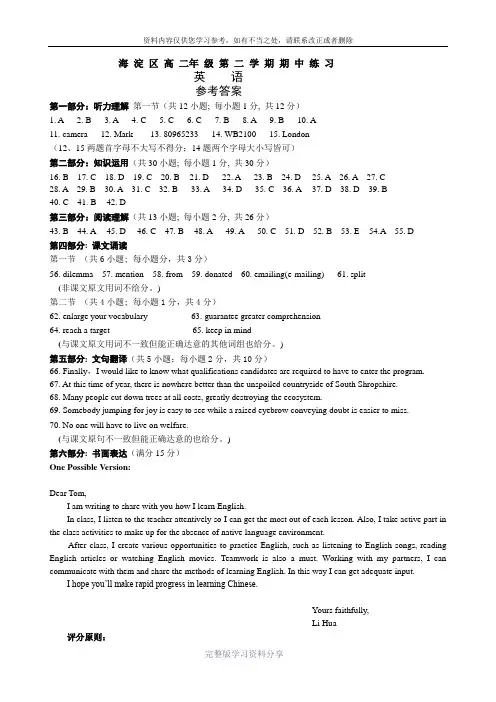
海淀区高二年级第二学期期中练习英语参考答案第一部分:听力理解第一节(共12小题; 每小题1分, 共12分)1. A2. B3. A4. C5. C6. C7. B8. A9. B 10. A11. camera 12. Mark 13. 80965233 14. WB2100 15. London(12、15两题首字母不大写不得分;14题两个字母大小写皆可)第二部分:知识运用(共30小题; 每小题1分, 共30分)16. B 17. C 18. D 19. C 20. B 21. D 22. A 23. B 24. D 25. A 26. A 27. C28. A 29. B 30. A 31. C 32. B 33. A 34. D 35. C 36. A 37. D 38. D 39. B40. C 41. B 42. D第三部分:阅读理解(共13小题; 每小题2分, 共26分)43. B 44. A 45. D 46. C 47. B 48. A 49. A 50. C 51. D 52. B 53. E 54.A 55. D第四部分: 课文诵读第一节(共6小题; 每小题分,共3分)56. dilemma 57. mention 58. from 59. donated 60. emailing(e-mailing) 61. split(非课文原文用词不给分。
)第二节(共4小题; 每小题1分,共4分)62. enlarge your vocabulary 63. guarantee greater comprehension64. reach a target 65. keep in mind(与课文原文用词不一致但能正确达意的其他词组也给分。
)第五部分: 文句翻译(共5小题;每小题2分,共10分)66. Finally,I would like to know what qualifications candidates are required to have to enter the program.67. At this time of year, there is nowhere better than the unspoiled countryside of South Shropshire.68. Many people cut down trees at all costs, greatly destroying the ecosystem.69. Somebody jumping for joy is easy to see while a raised eyebrow conveying doubt is easier to miss.70. No one will have to live on welfare.(与课文原句不一致但能正确达意的也给分。
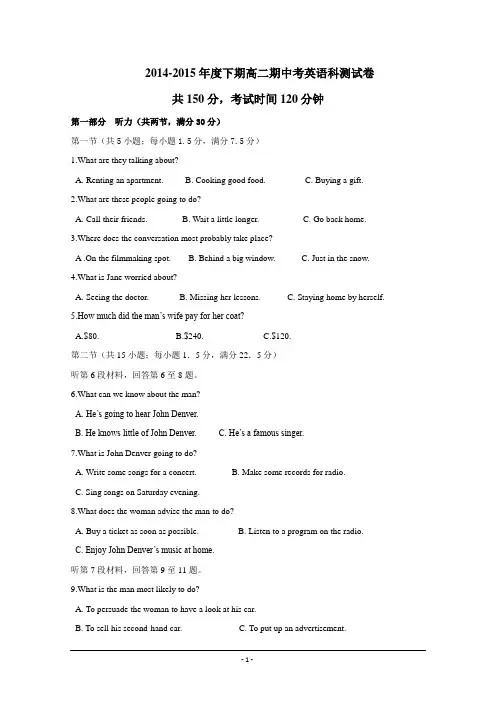
2014-2015年度下期高二期中考英语科测试卷共150分,考试时间120分钟第一部分听力(共两节,满分30分)第一节(共5小题;每小题1.5分,满分7.5分)1.What are they talking about?A. Renting an apartment.B. Cooking good food.C. Buying a gift.2.What are these people going to do?A. Call their friends.B. Wait a little longer.C. Go back home.3.Where does the conversation most probably take place?A .On the filmmaking spot. B. Behind a big window. C. Just in the snow.4.What is Jane worried about?A. Seeing the doctor.B. Missing her lessons.C. Staying home by herself.5.How much did the man’s wife pay for her coat?A.$80.B.$240.C.$120.第二节(共15小题;每小题1.5分,满分22.5分)听第6段材料,回答第6至8题。
6.What can we know about the man?A. He’s going to hear John Denver.B. He knows little of John Denver.C. He’s a famous singer.7.What is John Denver going to do?A. Write some songs for a concert.B. Make some records for radio.C. Sing songs on Saturday evening.8.What does the woman advise the man to do?A. Buy a ticket as soon as possible.B. Listen to a program on the radio.C. Enjoy John Denver’s music at home.听第7段材料,回答第9至11题。
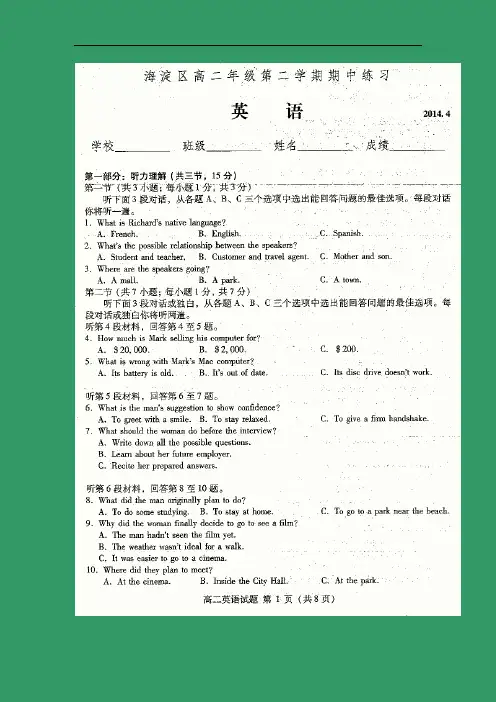
海淀区高二年级第二学期期中英语参考答案第一部分:听力理解第一节(共12小题; 每小题1分, 共12分)1. A2. B3. A4. C5. C6. C7. B8. A9. B 10. A11. camera 12. Mark 13. 80965233 14. WB2100 15. London(12、15两题首字母不大写不得分;14题两个字母大小写皆可)第二部分:知识运用(共30小题; 每小题1分, 共30分)16. B 17. C 18. D 19. C 20. B 21. D 22. A 23. B 24. D 25. A 26. A27. C 28. A 29. B 30. A 31. C 32. B 33. A 34. D 35. C 36. A 37.D 38. D 39. B 40. C 41. B 42. D第三部分:阅读理解(共13小题; 每小题2分, 共26分)43. B 44. A 45. D 46. C 47. B 48. A 49. A 50. C 51. D 52. B 53.E 54.A 55. D第四部分: 课文诵读第一节(共6小题; 每小题0.5分,共3分)56. dilemma 57. mention 58. from 59. donated 60. emailing(e-mailing) 61. split(非课文原文用词不给分。
)第二节(共4小题; 每小题1分,共4分)62. enlarge your vocabulary 63. guarantee greater comprehension 64. reach a target 65. keep in mind(与课文原文用词不一致但能正确达意的其他词组也给分。
)第五部分: 文句翻译(共5小题;每小题2分,共10分)66. Finally,I would like to know what qualifications candidates are required to have to enter the program.67. At this time of year, there is nowhere better than the unspoiled countrysideof South Shropshire.68. Many people cut down trees at all costs, greatly destroying the ecosystem.69. Somebody jumping for joy is easy to see while a raised eyebrow conveying doubt is easier to miss.70. No one will have to live on welfare.(与课文原句不一致但能正确达意的也给分。
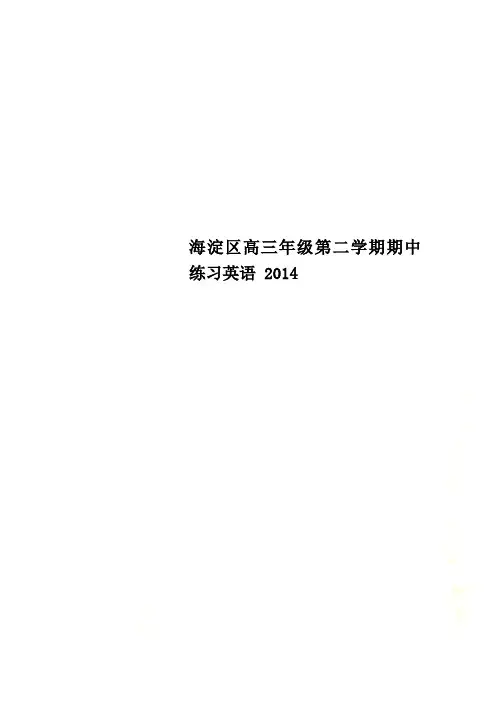
海淀区高三年级第二学期期中练习英语 2014海淀区高三年级第二学期期中练习英语 2014.04本试卷共12页,共150分。
考试时长120分钟。
第二部分:知识运用(共两节,45分)第一节单项填空(共15小题;每小题1分,共15分)从每题所给的A、B、C、D四个选项中,选出可以填入空白处的最佳选项,并在答题卡上将该项涂黑。
21. She calls back whenever someone ______ her a message.A. leftB. leavesC. had leftD. will leave22. The purpose of the article is to draw public attention ______ the problem.A. toB. onC. inD. for23. ______ the task in time, we had to work late into the night.A. FinishedB. FinishingC. To finishD. Having finished24. I know little about the accident because not much ______ about it up to now.A. has saidB. has been saidC. had saidD.Gallery last week have been found.A. stealingB. to stealC. stolenD. to be stolen31. You cannot take back your words ______ they are out of your mouth.A. beforeB. whetherC. onceD. while32. The App WeChat provides a networking platform ______ communication is faster and easier.A. whichB. whereC. whenD. why33. —Did you sleep well last night?— No, the loud noise from the street ______ me awake for hours.A. had keptB. is keepingC. has keptD. kept34. — Have you told your parents about your decision?— Not yet. I can hardly imagine ______ they will react.A. whatB. thatC. howD. when35. I think the biggest problem in banning smoking is ______ people can buy cigaretteseasily.A. thatB. whetherC. whereD. how第二节完形填空(共20小题;每小题1.5分,共30分)阅读下面短文,掌握其大意,从每题所给的A、B、C、D四个选项中,选出最佳选项,并在答题卡上将该项涂黑。
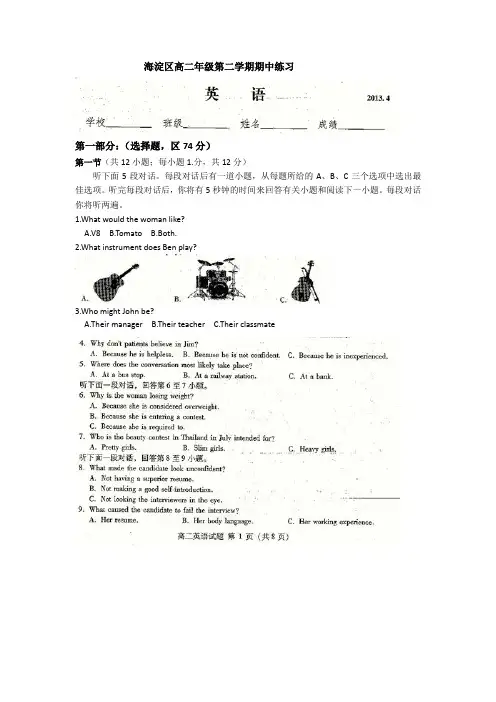
海淀区高二年级第二学期期中练习第一部分:(选择题,区74分)第一节(共12小题;每小题1.分,共12分)听下面5段对话。
每段对话后有一道小题,从每题所给的A、B、C三个选项中选出最佳选项。
听完每段对话后,你将有5秒钟的时间来回答有关小题和阅读下一小题。
每段对话你将听两遍。
1.What would the woman like?A.V8B.Tomato B.Both.2.What instrument does Ben play?3.Who might John be?A.Their managerB.Their teacherC.Their classmate二、单项选择(共10小题,每小题1分,共10分)13. In my opinion, Tom is such ____ sportive boy that he ______ strong of the two brothers.A. a; aB. the; theC. a; theD. the; a14. San Francisco is really a fascinating city and we’ve decided to stay for f_____ two week.A. othersB. anotherC. the otherD. other15. -Mum, can I play football with Tom this afternoon?-You can go out to play _____ you finish your homework first.A. unlessB. in caseC. even ifD. provided that16. -Peter, mum and dad have decided to take us to Australia this summer vacation!-Finally! We ______ a different holiday then!A. have spentB. will be spendingC. will have spentD. have been spending17. In my childhood, when my parents were away, it was my grandma who ________ accompany me to school.A. wouldB. couldC. shouldD. might18. It is not clear _____ the reform on reducing the burden on students can really work.A. couldB. couldC. shouldD. might19. -Hurry up! Your soup ________ cold by the time you ________ this book.-Yes, I’m coming.A. gets; finishB. gets; will finishC. will get’ have finishedD. will get; will finish20. Without the support of 332 votes, Obama ______ president of the US.A. wouldn’t be electedB. wouldn’t have been electedC. wont’ be electedD. won’t have been elected21. -I love Joana! She was standing by me when I was challenged in yesterday’s debate.-That’s ________ a real friend is for.A. whatB. howC. whyD. who22. -Will you go to the suburb for the holiday?-N o. I’m fully occupied, for there are so many problems ________.A. remaining to settleB. remained settlingC. remaining to be settledD. remained to be settled三、完形填空(共20小题,每小题1分,共20分)If OnlyHaving worked at a 7-Eleven store for two years, I thought I had become successful at what our manager calls “customer relations”. I firmly believed that a ___23___ smile and an automatic “sir”,“ma’ma”,and “thank you” would see me throu gh any ___24___ that I might meet.But one night an old woman ___25____ my faith that a glib response could smooth over the rough spotsof dealing with others.The moment she entered, the woman presented a sharp ___26_____ to our shiny store with its bright lighting and neatly arranged shelves. Walking as if each step were ___27___, she slowly pushed open the glass door and lamely ___28___ her way down the nearest aisle(通道).On such a cold night, she was wearing only a dress, a thin, sweater too small to ___29___, and there were no stockings or socks on her splotchy, blue-veined legs.After ____30____ around the store for several minutes, the old woman stopped in front of the rows of canned vegetables. She ___31___ up some corn niblets (玉米粒) and stared with a strange at the label. At stood close to her, my ___32___ became harder to maintain-her sweater was smelly and dirty.T o my bright “Can I help you?”she replied “I n eed some food, a ny kind.”“Well, the corn is ninety-five cents,” I said in my most helpful voice.“Or, if you like, we have a ___33___ on sausage today.”“I can’t pay,” she said.For a second, I intended to say, “Taken the corn.” But the employee r ules ___34___ into my mind:”…Remain polite, but do not let customers know that you are in ___35___. “. For a moment, I even held the idea that this was someone from the head office, ___36___ my loyalty. I responded ___37___, “I’m sorry, but I can’t give away anyt hing for ___38___.”The old woman’s face ___39____, and her hands trembled as she put the can back on the shelf. She passed me towards the door, her worn and dirty clothing hardly____40____ her bent back.Moments after she left, I rushed out the door with the can of corn, ___41___ she was nowhere in sight. For the rest of the day, I couldn’t drive her ___42___ off my mid. Wishing that I had act4ed like a human being rather a robot, I was sad to realize how fragile a hold we have on our better instincts(本能).23. A. hidden B. friendly C. weak D. forced24. A. regulation B. discrimination C. situation D. atmosphere25. A. shook B. proved C. supported D. doubted26. A. contrast B. conflict C. drop D. increase27. A. awful B. careful C. stressful D. painful28. A. felt B. pushed C. made D. fought29. A. dress B. button C. mend D. fold30. A. showing B. examining C. waiting D. wandering31. A. took B. turned C. picked D. sent32. A. smile B. gesture C. patience D. attention33. A. taste B. dropout C. welfare D. special34. A. broke B. crowded C. turned D. flooded35. A. response B. advance C. control D. trouble36. A. suspecting B. testing C. admiring D. performing37. A. curiously B. silently C. dutifully D. unconsciously38. A. free B. joy C. profit D. reward39. A. darkened B. weakened C. lightened D. frightened40. A. protecting B. covering C. showing D. exposing41. A. and B. but C. since D. as42. A. behavior B. smell C. expression D. image三、阅读理解第一节(共12小题,每小题2分,共24分)AMaurice Sendak, the award-winning writer and illustrator, died on May 8th, 2012. During his career he produced more than 100 children’s books. For over sixty years, his artistic skill brought to life richly imaginative worlds filled with children, animals and magical creatures. Two of his works, Where the Wild Thing Are and In the Night Kitchen, gave new ideas to modern children’s literature.Maurice Sendak was born in 1928 in New York City. His parents were Jewish immigrants from Poland. As a child, Maurice was often sick. As a result, he stayed home and read books and drew pictures to entertain himself.Maurice became known for stories that were often dark and intense. For example, Outside Over There is about a kidnapped(绑架)baby. Her sister leaves the safety of home to rescue the baby from a strange and dream-like world. Maurice said he got the idea for the story from a real-life kidnapping in 1932. The baby son of the famous pilot Charles Lindbergh was kidnapped from home and murdered. Maurice was only a small child at the time. But he never forgot his fear as he listened to the radio broadcasts about the baby kidnapping.Maurice grew up with continuous reminders about death. When he was sick, his grandmother dressed him in white clothes that she thought would help him avoid dying. During World War Two, many of his family members were murdered in the Nazi German death camps. He remembers his mother screaming and cry8ing each time she learned that another family member had been killed. Sometimes, his parents would talk about he dead relatives, especially the children.These influences help explain an important part of Maurice Sendak’s books. They often show children dealing with and overcoming evil forces and other complex situations. many of his stories are about a child trying to survive while facing fears or other difficult feelings. In his books, he skillfully combined adults’ point of view with children’s, and the dark and light in all of us.43. From the first paragraph we know that ______.A. Maurice Sendak got awarded because of two famous booksB. Maurice Sendakis a productive writer of children’s booksC. Maurice Sendak’s works children’s imaginationD. Maurice Sendak’s works deal with modern children’s life44. In his childhood, Maurice Sendak _____.A. often got sick of the outside worldB. moved from Poland with his parentsC. enjoyed himself in reading and drawingD. was afraid to listen to radio broadcast45. What can we learn about Maurice Sendak’s family?A. His mother often reminded him of the dead relatives.B. His grandmother preferred to be dressed in white.C. Many of his family members were killed by Nazi.D. His parents witnessed the baby kidnapping.46. What are Maurice Sendak’s books often abo ut?A. His own experience as a small child.B. Children getting over tough situations.C. Adults point of view combined with children’s.D. Dark and intense stories during World War Two.B.IBM, the technology company has released its latest “5 in5”report. The expert think five development will become realitywithin the next five years. Scientists at IBM and other companiesare researching ways to make the predictions come true.They say people will soon have a way to just think aboutcalling or e-mailing someone in order to make it happen. It’s asimple ability t o command a system to do something for youwithout actually doing or saying anything, literally thinking and having something happen as a result that's accurate. Something with really deep capability so that a person, for instance, a quadriplegic, a paraplegic can actually utilize brainwaves to make things happen and basically run their own lives independently.Another prediction is a way for people to powe r their homes and offices using energy from activities like walking or running. For example, you can see somebody in the third world who has access to a phone or a smart phone but doesn’t have access to the power grid(电力网), and literally a shoe can help gain energy from walking and can charge the battery to enable that person to actually become a connected with the rest of the world.Passwords could soon become a thing of the past. Some of the most common biometrics used to identify people are fingerprints, face and voice recognition, and iris scans. The iris is the colored part of the eye. Dr. Bernie Myerson says this technology will soon be more widely used by money machines and other devices.Another prediction is from the experts at EBM: better technology to prevent unwantede-mail."The device, as you act upon it, as you eliminate mail, you don't read it, you just look at it and kill it, after a while it learns your habits and works for you as your assistant by eliminating stuff you never wanted anyway,” says Dr. Bernie Myerson.The last on IBM's 5 in 5 list is an end to the "digital divide" between those who have technology and those who do not. Dr. Bernie Myerson says, "Think about the digital divide today: the haves and the have-nots, people who are and are not connected. We expect within five years, better than80% coverage of the world’s populations by cellular to smartphones. At that point, imagine having, for instance, the ability to speak openly with anybody anywhere, anytime and any language -- real time translation.47. In the first prediction, people will soon have a way to make things happen by _______.A. using brainwavesB. e-mailing somebodyC. making a callD. talking to somebody48. from the example in Para. 3, we can learn that in the third world ______.A. people may have no access to electricityB. more people are possessing smart phonesC. people can gain energy merely from shoesD. scientists are trying to set up the power grid49. The “device” mentioned in Para. 5 can help you to ______.A. from your e-mail reading habitB. read e-mail as your assistantC. send e-mail much more freelyD. delete your unwanted e-mail50. What can be inferred from the last paragraph?A. The problem with the digital divide has been dealt with.B. Only 20% of people still have no access to hi-tech phones.C. There may be no language barriers among people using smart phones.D. People from every corner of the world can be connected by the Internet.CScientists Announce Age of Tailored Cancer Care-Thanks to Your DNAA decade ago it took tense of millions of pounds and many years to sequence the complete genome of one individual. Now it takes a few hundred pounds and a couple of days to decode the entire DNA of a cancer cell.The rapid pace of change in DNA sequencing is leading to a transformation in the diagnosis and treatment of cancer. In the coming decade every cancer patient will receive a genetic profile of their disease, scientists predict.An age of personalized medicine where patients receive tailored treatments based on their DNA rather than just their symptoms could end the one-drug-treats-all approach to cancer treatment, which has failed many patients in the past, they said.The revolution will also mean that the classic method of testing new drugs and treatments based on large scale of clinical trials with thousands of patients will be replaced by more targeted approach focused on a smaller number of individuals with known genetic profiles.Rapid DNA sequencing will signal an age where cancer drugs will be made for patients based on the type of DMA mutations (转变) carried within their tumor(肿瘤), scientists said. “In part it might signal a significant shift in the way medicine is performed for cancer in the 21st century,” said Professor Alan Ashworth, chief executive of the Institute of Cancer Research of London.“This is not science fiction. It’s happening in a number of places around the world but we feel it will be absolutely routine within the next five to ten years for every cancer patient,” said Professor Ashworth, adding that it could mean drugs designed for one type of cancer will be used in the treatment of quite different cancers, as scientists uncover common biochemical pathways that link one disease to another.“It opens up the possibility of using drugs in a context in which they were not originally developed,” Professor Ashworth said. It could also change the whole approach to drug development and clinical trials. He added, “In the past, drugs have been developed with large clinical trials involving thousands of patients and working out what is best for the average patient. What we are saying now is to look at what is best for the individual patient. It may be that in certain rare cancer types, a drug may be considered effective, even though there may well never be clinical trial evidence to prove it.”51. The underlined word “tailored” in Para. 3 probably means ______.A. fitting one personB. well designedC. conveniently madeD. aiming at common people52. Compared with the new approach, the old method of drug development ________.A. is focused on a small number of patientsB. is based on a large number of tests on patientsC. works out what is best for one particular patientD. cannot produce trial evidence to prove a drug’s effect53. It can be inferred from the passage that ______.A. A decade ago patients with unknown genetic profiles cannot be treated.B. Cancer treatment in the future will be mainly based on the symptoms of the patients.C. the revolution in cancer treatment is a result of the rapid change in DNA sequencing.D. Up to now the one-drug-treats-all approach to cancer treatment has been workingproperly.第二节(共4小题;每小题2分,共8分)根据短文内容,从短文后的五个选项中选出能填入空白处的最佳选项。
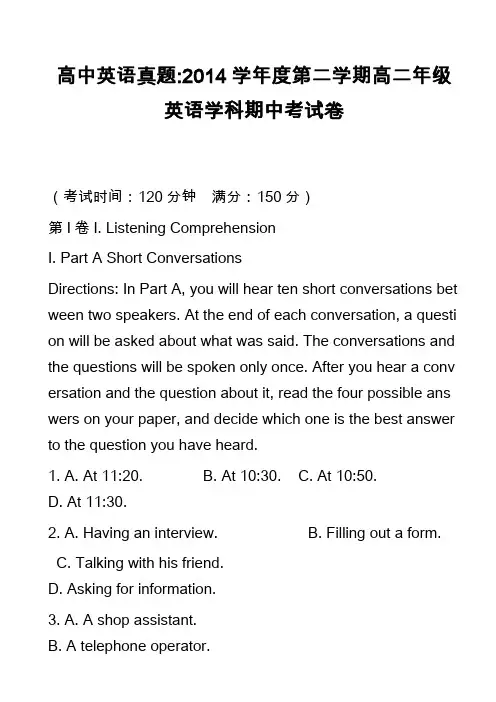
高中英语真题:2014学年度第二学期高二年级英语学科期中考试卷(考试时间:120分钟满分:150分)第I卷I. Listening ComprehensionI. Part A Short ConversationsDirections: In Part A, you will hear ten short conversations bet ween two speakers. At the end of each conversation, a questi on will be asked about what was said. The conversations and the questions will be spoken only once. After you hear a conv ersation and the question about it, read the four possible ans wers on your paper, and decide which one is the best answer to the question you have heard.1. A. At 11:20. B. At 10:30. C. At 10:50.D. At 11:30.2. A. Having an interview. B. Filling out a form.C. Talking with his friend.D. Asking for information.3. A. A shop assistant.B. A telephone operator.C. A waitress.D. A clerk.4. A. At home. B. In an office.C. In a car.D. On the street.5. A. A railway porter.B. A telephone operator.C. A bus conductor.D. A postal clerk.6. A. A father and a son. B. A teacher and his s tudent.C. A student and his classmate.D. A librarian and a st udent.7. A. A movie. B. A lecture. C. A play.D. A speech.8. A. The man won’t become a superstar.B. The man has no gift for table tennis.C. The man should find a new partner.D. The man should not give up.9. A. His injury kept him at home.B. He didn’t consider it necessary.C. He was too weak to see the doctor.D. He failed to make an appointment.10. A. He wants to get a new position.B. He is asking the woman for help.C. He has left the woman a good impression.D. He enjoys letter writing.Part B PassagesDirections: In Part B, you will hear two short passages, and yo u will be asked three questions on each of the passages. The passages will be read twice, but the questions will be spoken only once. When you hear a question, read the four possible answers on your paper and decide which one would be the be st answer to the question you have heard.Questions 11 through 13 are based on the following passage.11. A. On Tuesdays and Wednesdays.B. On Tuesdays and Thursdays.C. On Wednesdays and Thursdays.D. On Tuesdays and Fridays.12. A. Once a week.B. Twice a week.C. Once a month.D. Twice a month.13. A. Classroom tests.B. Attendance rate.C. Research papers.D. Final exam.Questions 14 through 16 are based on the following passage.14. A. Photographs. B. Books. C. Films.D. Music.15. A. Poverty. B. Disasters.C. Racial injustice.D. Crime.16. A. He was the first director of .B. He lived a poor life in his childhood.C. He was born in Middle Eastern Africa.D. He picked up photography in 1912.Part C Longer ConversationsDirections: In Part C, you will hear two longer conversations. The conversations will be read twice. After you hear each con versation, you are required to fill in the numbered blanks with the information you have heard. Write your answers on your a nswer sheet.Blanks 17 through 20 are based on the following conversation .Complete the form. Write ONE WORD for each answer.Blanks 21 through 24 are based on the following conversation .Complete the form. Write NO MORE THAN THREE WORDS for each answer.II. GrammarDirections: After reading the passages below, fill in the blanksto make the passages coherent and grammatically correct. F or the blanks with a given word, fill in each blank with the prop er form of the given word; for the other blanks, use one word t hat best fits each blank.(A)When you start talking about good and bad manners, you im mediately start meeting difficulties. Many people just cannot a gree with what they mean. We asked a lady, who replied that she thought you could judge a well-mannered person 25. the way they occupied the space ar ound them --- for example, when such a person walks down a street, he or she is constantly aware of 26.______. Such people never bu mp into other people.However, a second person thought that this was more a quest ion of civilized behavior 27.______ good manners. Instead, thi s other person told us a story, 28.______ he said was quite we ll known, about an American who 29.______ (invite) to an Ara b meal in one of the countries of the Middle East. The Americ an hadn’t been told very much about the kind of food he might expect. If he had known about Arab food, he might have beh aved better.Immediately before him was a very flat piece of bread that looked, to him, very much like a napkin. Picking it up, he put it int o his collar, 30.______ _______it fell across his shirt. His Arab host, who had been watching, 31.______ (say) nothing, but i mmediately copied the action of his guest.And that, said this second person, 32.______ (be)a fine exam ple of good manners.(B)Over the last 25 years, British society has changed a great de al--- or at least many parts of it have. In some ways, 33.______, v ery little has changed, particularly where attitudes are concern ed. Ideas about social class --- 34.______ a person is “working-class” or “middle-class” --- are one area in which changes have been extremely slow.In the past, the working-class tended 35.______ (pay) less than middle-class people, such as teachers and doctors. As a result of this and also of the fact 36.______ work ers’ jobs were generally m uch less secure, distinct differences in life-styles and attitudes came into existence. The typical working man would collect his wages on Friday evening and then, 37. ______ (give) his wife her “housekeeping”, would go out and s pend the rest on beer and betting.The stereotype of 38.______ a middle-class man did with his money was perhaps nearer the truth. H e was --- and still is --- likely to take a longer-term view. Not only 39.______ he regard buying a house as a top priority, but he also considered the education of his childre n as extremely important. Both of these provide him and his fa mily with security. Only in very few cases did workers have th e opportunity (or the education and training) 40.______ (make) such long-term plans.Vocabulary(10分)Directions: Complete the following passage by using the word s in the box. Each word can only be used once. Note that ther e is one word more than you need.A.partly B.satisfy C.place D.familiarE.understanding F.collected G.honoring H.roleI.improved J.strict K. likelyArt museums are places where people can learn about variou s cultures. The increasingly popular “design museums” that ar e opening today, however, perform quite a different __41__. U nlike most art museums, the design museum shows objects t hat are easily found by the general public. These museums sometimes even __42___ things like fridges and washing mach ines in the center of the hall.People have argued that design museums are often made us e of as advertisements for new industrial technology. But their role is not simply a matter of sales--it is the ___43___ of excellently invented products. The differe nce between the window of a department store and the showc ase in a design museum is that the first tries to sell you somet hing, while the second tells you the success of a sale.One advantage of design museums is that they are places wh ere people feel __44___ with the exhibits. Unlike the average art museum visitors, design museum visitors seldom feel frigh tened or puzzled. This is __45__ because design museums cl early show how and why mass-produced products work and look as they do, and how design has __46__ the quality of our lives. Art museum exhibits, on th e other hand, would most probably fill visitors with a feeling th at there is something beyond their __47__.In recent years, several new design museums have opened t heir doors. Each of these museums has tried to __48__ the pu blic’s growing interest in the field with new ideas. London’s , f or example, shows a collection of mass-produced objects from Zippo lighters to electric typewriters toa group of Italian fish-tins. The choices open to design museums seem far less __4 9__ than those to art museums, and visitors may also sense t he humorous part of our society while walking around such ex hibits as interesting and unusually attractive toys ___50___ in our everyday life .IV. Reading ComprehensionSection ADirections: For each blank in the following passage there are f our words or phrases marked A, B, C and D. Fill in each blank with the word or phrase that best fits the context.Success often depends on your performance at an interview. For those who are well prepared, it can be a 51 experience but for others it can be a 52 time. Love them or hate them, t hough, your job prospects are largely dependent on your inter view 53 . It’s not unusual for a company to have fifty or sixty applicants, for a job, so if you are asked to attend a(n) 54 , y ou are a serious competitor being seriously 55 for the post. Usually companies give you at least a day’s notice of an inter view, so use that time to 56 yourself well. Read through the job description and any information sent to you, and prepare answers to as many questions as you can 57 .At an interview, try to present a “ 58 ” version of yourself. Yo u need to 59 the employer that you can do the job, 60 yo u mustn’t appear over-confident. Being pleasant, however, doesn’t mean that you sh ould 61 with everything that the interviewer says. Most com panies want to elect someone with his or her own 62 .It’s also important to make sure that you really listen to what i s being asked. In your preparation you will have rehearsed an swers to a number of imaginary questions; but you must 63 your response to suit the questions.It’s worthwhile spending a few moments after the interview 6 4 your performance. You can do this best before you know t he 65 . What aspects of the interview went well? What do y ou need to improve? What would you do differently next time?51. A. common B. positive C. first-hand D. discouraging52. A. terrifying B. agreeable C. appointedD. convenient53. A. skills B. craft C. efficiencyD. qualifications54. A. occasion B. situation C. interview D. ceremony55. A. trained B. wanted C. appliedD. considered56. A. decorate B. shape C. dressD. prepare57. A. worry about B. think of C. refer toD. ask for58. A. pleasant B. modern C. dramaticD. formal59. A. confirm B. prove C. convinceD. guarantee60. A. then B. and C. butD. therefore61. A. deal B. agree C. compareD. discuss62. A. opinion B. belief C. characterD. personality63. A. give B. shift C. find D. tailor64. A. conducting B. attending C. analyzingD. directing65. A. performance B. result C. interviewD. positionSection BDirections: Read the following passages. Each passage is foll owed by several questions. For each of them there are four c hoices marked A,B,C and D. Choose the one that fits best acc ording to the information given in the passage you have just r ead.AThe morning had been a disaster. My tooth was aching, and I’d been in an argument with a friend. Her words still hurt:“The trouble with you is that you won’t put yourself in my plac e. Can’t you see things from my point of view?” I shook my he ad stubbornly—and felt the ache in my tooth. I’d thought I could hold out till m y dentist came back from holiday, but the pain was really unb earable. I started calling the dentists in the phonebook, but no one could see me immediately. Finally, at about lunch time, I got lucky.“If you come by right now,” the receptionist said, “the dentist w ill fit you in .”I look my purse and keys and rushed to my car. But suddenlyI began to doubt about the dentist. What kind of dentist would be so eager to treat someone at such short notice? Why wasn ’t he as busy as the others?In the dentist’s office, I sat down and looked around. I saw not hing but the bare walls and I became even more worried. The assistant noticed my nervousness and placed her warm hand over my ice-cold one.When I told her my fears, she laughed and said ,“Don’t worry. The dentist is very good.”“How long do I have to wait for him? ”I asked impatiently.“Come on, he is coming. Just lie down and relax. And enjoy th e artwork,” the assistant said.“The artwork?” I was puzzled.The chair went back, suddenly I smiled. There was a beautiful picture, right where I could enjoy it, on the ceiling. How consi derate the dentist was! At that moment, I began to understand what my friend meant by her words.What a relief!66. Which of the following best describes the author’s feeling t hat morning?A. Cheerful.B. Nervous.C. Satisfied.D. Upset.67. What made the author begin to doubt about the dentist?A. The dentist’s agreeing to treat her at very short notice.B. The dentist’s being as busy as the other dentists.C. The surroundings of the dentist’s office.D. The laughing assistant of the dentist.68. Why did the author suddenly smile?A. Because the dentist came at last.B. Because she saw a picture on the ceiling.C. Because she could relax in the chair.D. Because the assistant kept comforting her.69. What did the author learn from her experience most proba bly?A. Strike while the iron is hot.B. Have a good word for one’s friendC. Put oneself in other’s shoesD. A friend in need is a friend indeed.B70. The phrase “a gra nt” in the first line most probably means _____.A. bank interestB. a credit cardC. an education feeD. financial aid71. A student from Japan who has been studying in for a yea r and intends togo to college in a few months will _____.be unable to get money from any LEAget money if taking a first degree courseget money from LEA when finishing his coursehave to open a bank account before getting money72. A 31-year-old nurse wishes to qualify as a doctor at a university. She ha s workedsince she was 25. How much extra money will she get a year ?None. B. £155. C. £615.D. £515.73. A big bank offers a new student special services because _____.A. they need student accounts badlyB. they charge students extra interestC. they know he can get money regularlyD. they hope he’ll be a potential customerCPublicity(宣传) offers several benefits. There are not costs for message ti me or space. An ad in prime-time television may cost $250,000 to $5,000,000 or more per minute, whereas a five-minute report on a network newscast would not cost anything. Publicity reaches a mass audience within a short time and ne w products or company policies are widely known.Credibility about messages is high, because they are reported in independent media. A newspaper review of a movie has more believability than an ad in the same paper, because the re ader associates independence with objectivity. Similarly, peop le are more likely to pay attention to news reports than to ads. For example, Women’s Wear Daily has both fashion reports and advertisements. Readers spend time reading the stories, but they skim through the ads. Furthermore, there may be 10 commercials during a half-hour television program or hundreds of ads in a magazine. Fe ature stories are much fewer in number and stand out clearly.Publicity also has some significant limitations. A firm has little control over messages, their timing, their placement, or their c overage by a given medium. It may issue detailed news relea ses and find only portions mentioned by the media, and medi a have the ability to be much more critical than a firm would li ke.For example, in 1982, Procter & Gamble faced a massiv e publicity problem over the meaning of its 123-year-old company logo. To fight this negative publicity, the firm had a spokesperson appear on Good Morning America to disprov e the rumor(谣言). The false rumors were temporarily put to rest. However, in 1985, publicity became so troublemaking that Procter & Gamble decided to remove the logo from its products.A firm may want publicity during certain periods, such as whe n a new product is introduced or new store opened, but the m edia may not cover the introduction or opening until after the ti me it would aid the firm. Similarly, media determine the place ment of a story; it may follow a report on crime or sports. Final ly, the media decide whether to cover a story at all and the a mount of coverage to be devoted to it.74. All of the following advantages of publicity are mentioned EXCEPT _____.A. time savingB. attentivenessC. credibilityD. profitability75. Compared with ad, news report or featuring stories are m ore _____.A. believableB. clearC. dependentD. subjective76. The example of “Procter & G amble” is given to show ____ _.A. the efficient way of disproving rumorsB. the importance of a spokespersonC. the interaction between firms and mediaD. the negative effect of publicity77. What’s the author’s attitude towards publicity?A. doubtfulB. objectiveC. passiveD. supportiveSection CDirections: Read the passage carefully. Then answer the que stions or complete the statements in the fewest possible word s.The motor vehicle has killed and disabled more people in its b rief history than any bomb or weapon ever invented. Much of t he blood on the street flows essentially from uncivil behavior o f drivers who refuse to respect the legal or moral rights of othe rs. So the massacre(屠杀)on the road may be regarded as a social problem.In fact, the enemies of society on wheels are rather harmless people just ordinary people acting carelessly, you might say. But it is a principle both of law and common morality that carel essness is no excuse when one’s actions could bring death or damages to others. A minority of the killers go even beyond carelessness to total negligence.Researchers have estimated that as many as 80 percent of all automobile accidents can be connected with psychological c ondition of the driver. Emotional upsets can affect drivers’ rea ctions, slow their judgment, and blind them to dangers that mi ght otherwise be evident. The experts warn that it is vital for e very driver to make a conscious effort to keep one’s emotions under control.Yet the irresponsibility that accounts for much of the problem i s not limited to drivers. Street walkers regularly ignore traffic r egulations. They are at fault in most vehicle walker accidents; and many cyclists even believe that they are not subject to th e basic rules of the road.In the past few years, safety standards for vehicle have been raised both at the point of manufacture and through periodic r oad-worthiness inspections. In addition, speed limits have been lo wered. Due to these measures, the accident rate has decreas ed. But the accident experts still worry because there has bee n little or no improvement in the way drivers behave. The onlyreal and lasting solution, say the experts, is to convince peopl e that driving is a skilled task requiring constant care and con centration. Those who fail to do all these things present a thre at to those with whom they share the road.(Note: Answer the questions or complete the statements in N O MORE THAN TEN WORDS.)78. Why road killers can’t be excused?Because __________.79. In order to avoid automobile accidents, the experts sugge st drivers should __________.80. Besides drivers, who should also be blamed for most road s accidents?81. The accident rate has decreased in the past few years be cause of __________.第II卷I. TranslationDirections: Translate the following sentences into English, usi ng the words given in the brackets.他总是不懂装懂。
北京四中2014年下学期高二期中考试英语试卷有答案(试卷满分为150分,考试时间为120分钟)第一卷(三部分,共120分)第一部分:听力(共三节,满分20分)第一节(共5小题;每小题1分,共5分)听下面5段对话。
每段对话后有一道小题,从每题所给的A、B、C三个选项中选出最佳选项。
听完每段对话后,你将有10秒钟的时间来回答有关小题和阅读下一小题。
每段对话你将听一遍。
1. How old is the girl?A. 7.B. 8.C. 10.2. Where does the conversation most probably take place?A. In a bank.B. In a store.C. In a library.3. How will the two speakers travel?A. By bus.B. By car.C. By train.4. What are the two speakers talking about?A. Their work.B. Their manager.C. Their meeting.5. What is the woman's problem?A. She is thirsty.B. She is sick.C. She is tired.第二节(共10小题;每小题1分,共10分)听下面4段对话。
每段对话后有几道小题,从每题所给的A、B、C三个选项中选出最佳选项。
听每段对话前,你将有5秒钟的时间阅读每小题。
听完后,每小题将给出5秒钟的作答时间。
每段对话你将听两遍。
听第6段材料,回答第6至7题。
6. How much time does the woman spend watching TV every day?A. About half an hour.B. About two hours.C. About four hours.7. What is the conversation mainly about?A. Types of TV programs.B. Popular TV shows.C. TV watching habits.听第7段材料,回答第8至9题。
海淀区高二年级第二学期期中练习第一部分:(选择题,区74分)第一节(共12小题;每小题1.分,共12分)听下面5段对话。
每段对话后有一道小题,从每题所给的A、B、C三个选项中选出最佳选项。
听完每段对话后,你将有5秒钟的时间来回答有关小题和阅读下一小题。
每段对话你将听两遍。
1.What would the woman like?A.V8B.Tomato B.Both.2.What instrument does Ben play?3.Who might John be?A.Their managerB.Their teacherC.Their classmate二、单项选择(共10小题,每小题1分,共10分)13. In my opinion, Tom is such ____ sportive boy that he ______ strong of the two brothers.A. a; aB. the; theC. a; theD. the; a14. San Francisco is really a fascinating city and we’ve decided to stay for f_____ two week.A. othersB. anotherC. the otherD. other15. -Mum, can I play football with Tom this afternoon?-You can go out to play _____ you finish your homework first.A. unlessB. in caseC. even ifD. provided that16. -Peter, mum and dad have decided to take us to Australia this summer vacation!-Finally! We ______ a different holiday then!A. have spentB. will be spendingC. will have spentD. have been spending17. In my childhood, when my parents were away, it was my grandma who ________ accompany me to school.A. wouldB. couldC. shouldD. might18. It is not clear _____ the reform on reducing the burden on students can really work.A. couldB. couldC. shouldD. might19. -Hurry up! Your soup ________ cold by the time you ________ this book.-Yes, I’m coming.A. gets; finishB. gets; will finishC. will get’ have finishedD. will get; will finish20. Without the support of 332 votes, Obama ______ president of the US.A. wouldn’t be electedB. wouldn’t have been electedC. wont’ be electedD. won’t have been elected21. -I love Joana! She was standing by me when I was challenged in yesterday’s debate.-That’s ________ a real friend is for.A. whatB. howC. whyD. who22. -Will you go to the suburb for the holiday?-N o. I’m fully occupied, for there are so many problems ________.A. remaining to settleB. remained settlingC. remaining to be settledD. remained to be settled三、完形填空(共20小题,每小题1分,共20分)If OnlyHaving worked at a 7-Eleven store for two years, I thought I had become successful at what our manager calls “customer relations”. I firmly believed that a ___23___ smile and an automatic “sir”,“ma’ma”,and “thank you” would see me throu gh any ___24___ that I might meet.But one night an old woman ___25____ my faith that a glib response could smooth over the rough spotsof dealing with others.The moment she entered, the woman presented a sharp ___26_____ to our shiny store with its bright lighting and neatly arranged shelves. Walking as if each step were ___27___, she slowly pushed open the glass door and lamely ___28___ her way down the nearest aisle(通道).On such a cold night, she was wearing only a dress, a thin, sweater too small to ___29___, and there were no stockings or socks on her splotchy, blue-veined legs.After ____30____ around the store for several minutes, the old woman stopped in front of the rows of canned vegetables. She ___31___ up some corn niblets (玉米粒) and stared with a strange at the label. At stood close to her, my ___32___ became harder to maintain-her sweater was smelly and dirty.T o my bright “Can I help you?”she replied “I need some food, any kind.”“Well, the corn is ninety-five cents,” I said in my most helpfu l voice. “Or, if you like, we have a ___33___ on sausage today.”“I can’t pay,” she said.For a second, I intended to say, “Taken the corn.” But the employee r ules ___34___ into my mind:”…Remain polite, but do not let customers know that you are in ___35___. “. For a moment, I even held the idea that this was someone from the head office, ___36___ my loyalty. I responded ___37___, “I’m sorry, but I can’t give away anything for ___38___.”The old woman’s face ___39____, and her hands trembled as she put the can back on the shelf. She passed me towards the door, her worn and dirty clothing hardly____40____ her bent back.Moments after she left, I rushed out the door with the can of corn, ___41___ she was nowhere in sight. For the rest of the day, I couldn’t d rive her ___42___ off my mid. Wishing that I had act4ed like a human being rather a robot, I was sad to realize how fragile a hold we have on our better instincts(本能).23. A. hidden B. friendly C. weak D. forced24. A. regulation B. discrimination C. situation D. atmosphere25. A. shook B. proved C. supported D. doubted26. A. contrast B. conflict C. drop D. increase27. A. awful B. careful C. stressful D. painful28. A. felt B. pushed C. made D. fought29. A. dress B. button C. mend D. fold30. A. showing B. examining C. waiting D. wandering31. A. took B. turned C. picked D. sent32. A. smile B. gesture C. patience D. attention33. A. taste B. dropout C. welfare D. special34. A. broke B. crowded C. turned D. flooded35. A. response B. advance C. control D. trouble36. A. suspecting B. testing C. admiring D. performing37. A. curiously B. silently C. dutifully D. unconsciously38. A. free B. joy C. profit D. reward39. A. darkened B. weakened C. lightened D. frightened40. A. protecting B. covering C. showing D. exposing41. A. and B. but C. since D. as42. A. behavior B. smell C. expression D. image三、阅读理解第一节(共12小题,每小题2分,共24分)AMaurice Sendak, the award-winning writer and illustrator, died on May 8th, 2012. During his career he produced more than 100 children’s books. For over sixty years, his artistic skill brought to life richly imaginative worlds filled with children, animals and magical creatures. Two of his works, Where the Wild Thing Are and In the Night Kitchen, gave new ideas to modern children’s literature.Maurice Sendak was born in 1928 in New York City. His parents were Jewish immigrants from Poland. As a child, Maurice was often sick. As a result, he stayed home and read books and drew pictures to entertain himself.Maurice became known for stories that were often dark and intense. For example, Outside Over There is about a kidnapped(绑架)baby. Her sister leaves the safety of home to rescue the baby from a strange and dream-like world. Maurice said he got the idea for the story from a real-life kidnapping in 1932. The baby son of the famous pilot Charles Lindbergh was kidnapped from home and murdered. Maurice was only a small child at the time. But he never forgot his fear as he listened to the radio broadcasts about the baby kidnapping.Maurice grew up with continuous reminders about death. When he was sick, his grandmother dressed him in white clothes that she thought would help him avoid dying. During World War Two, many of his family members were murdered in the Nazi German death camps. He remembers his mother screaming and cry8ing each time she learned that another family member had been killed. Sometimes, his parents would talk about he dead relatives, especially the children.These influences help explain an important part of Maurice Sendak’s books. They often show children dealing with and overcoming evil forces and other complex situations. many of his stories are about a child trying to survive while facing fears or other difficult feelings. In his books, he skillfully combined adults’ point of view with children’s, and the dark and light in all of us.43. From the first paragraph we know that ______.A. Maurice Sendak got awarded because of two famous booksB. Maurice Sendakis a productive writer of children’s booksC. Maurice Sendak’s works children’s imaginationD. Maurice Sendak’s works deal with modern children’s life44. In his childhood, Maurice Sendak _____.A. often got sick of the outside worldB. moved from Poland with his parentsC. enjoyed himself in reading and drawingD. was afraid to listen to radio broadcast45. What can we learn about Maurice Sendak’s family?A. His mother often reminded him of the dead relatives.B. His grandmother preferred to be dressed in white.C. Many of his family members were killed by Nazi.D. His parents witnessed the baby kidnapping.46. What are Maurice Sendak’s books often about?A. His own experience as a small child.B. Children getting over tough situations.C. Adults point of view combined with children’s.D. Dark and intense stories during World War Two.B.IBM, the technology company has released its latest “5 in5”report. The expert think five development will beco me realitywithin the next five years. Scientists at IBM and other companiesare researching ways to make the predictions come true.They say people will soon have a way to just think aboutcalling or e-mailing someone in order to make it happen. It’s asimple ability t o command a system to do something for youwithout actually doing or saying anything, literally thinking and having something happen as a result that's accurate. Something with really deep capability so that a person, for instance, a quadriplegic, a paraplegic can actually utilize brainwaves to make things happen and basically run their own lives independently.Another prediction is a way for people to powe r their homes and offices using energy from activities like walking or running. For example, you can see somebody in the third world who has access to a phone or a smart phone but doesn’t have access to the power grid(电力网), and literally a shoe can help gain energy from walking and can charge the battery to enable that person to actually become a connected with the rest of the world.Passwords could soon become a thing of the past. Some of the most common biometrics used to identify people are fingerprints, face and voice recognition, and iris scans. The iris is the colored part of the eye. Dr. Bernie Myerson says this technology will soon be more widely used by money machines and other devices.Another prediction is from the experts at EBM: better technology to prevent unwantede-mail."The device, as you act upon it, as you eliminate mail, you don't read it, you just look at it and kill it, after a while it learns your habits and works for you as your assistant by eliminating stuff you never wanted anyway,” says Dr. Bernie Myerson.The last on IBM's 5 in 5 list is an end to the "digital divide" between those who have technology and those who do not. Dr. Bernie Myerson says, "Think about the digital divide today: the haves and the have-nots, people who are and are not connected. We expect within five years, better than80% coverage of the world’s populations by cellular to smartphones. At that point, imagine having, for instance, the ability to speak openly with anybody anywhere, anytime and any language -- real time translation.47. In the first prediction, people will soon have a way to make things happen by _______.A. using brainwavesB. e-mailing somebodyC. making a callD. talking to somebody48. from the example in Para. 3, we can learn that in the third world ______.A. people may have no access to electricityB. more people are possessing smart phonesC. people can gain energy merely from shoesD. scientists are trying to set up the power grid49. The “device” mentioned in Para. 5 can help you to ______.A. from your e-mail reading habitB. read e-mail as your assistantC. send e-mail much more freelyD. delete your unwanted e-mail50. What can be inferred from the last paragraph?A. The problem with the digital divide has been dealt with.B. Only 20% of people still have no access to hi-tech phones.C. There may be no language barriers among people using smart phones.D. People from every corner of the world can be connected by the Internet.CScientists Announce Age of Tailored Cancer Care-Thanks to Your DNAA decade ago it took tense of millions of pounds and many years to sequence the complete genome of one individual. Now it takes a few hundred pounds and a couple of days to decode the entire DNA of a cancer cell.The rapid pace of change in DNA sequencing is leading to a transformation in the diagnosis and treatment of cancer. In the coming decade every cancer patient will receive a genetic profile of their disease, scientists predict.An age of personalized medicine where patients receive tailored treatments based on their DNA rather than just their symptoms could end the one-drug-treats-all approach to cancer treatment, which has failed many patients in the past, they said.The revolution will also mean that the classic method of testing new drugs and treatments based on large scale of clinical trials with thousands of patients will be replaced by more targeted approach focused on a smaller number of individuals with known genetic profiles.Rapid DNA sequencing will signal an age where cancer drugs will be made for patients based on the type of DMA mutations (转变) carried within their tumor(肿瘤), scientists said. “In part it might signal a significant shift in the way medicine is performed for cancer in the 21st century,” said Professor Alan Ashworth, chief executive of the Institute of Cancer Research of London.“This is not science fiction. It’s happening in a number of places around the world but we feel it will be absolutely routine within the next five to ten years for every cancer patient,” said Professor Ashworth, adding that it could mean drugs designed for one type of cancer will be used in the treatment of quite different cancers, as scientists uncover common biochemical pathways that link one disease to another.“It opens up the possibility of using drugs in a context in which they were not originally develop ed,” Professor Ashworth said. It could also change the whole approach to drug development and clinical trials. He added, “In the past, drugs have been developed with large clinical trials involving thousands of patients and working out what is best for the average patient. What we are saying now is to look at what is best for the individual patient. It may be that in certain rare cancer types, a drug may be considered effective, even though there may well never be clinical trial evidence to prove it.”51. T he underlined word “tailored” in Para. 3 probably means ______.A. fitting one personB. well designedC. conveniently madeD. aiming at common people52. Compared with the new approach, the old method of drug development ________.A. is focused on a small number of patientsB. is based on a large number of tests on patientsC. works out what is best for one particular patientD. cannot produce trial evidence to prove a drug’s effect53. It can be inferred from the passage that ______.A. A decade ago patients with unknown genetic profiles cannot be treated.B. Cancer treatment in the future will be mainly based on the symptoms of the patients.C. the revolution in cancer treatment is a result of the rapid change in DNA sequencing.D. Up to now the one-drug-treats-all approach to cancer treatment has been workingproperly.第二节(共4小题;每小题2分,共8分)根据短文内容,从短文后的五个选项中选出能填入空白处的最佳选项。
北京市海淀区2014届高三第二学期期末练习英语试题本试卷分为第Ⅰ卷(选择题)和第Ⅱ卷(非选择题)两部分.共150分,考试时间120分钟.第一部分:听力(共三节,满分30分)做题时,先将答案划在试卷上。
录音内容结束后,你将有两分钟的时间将试卷上的答案转涂到答题卡上。
第一节(共5小题;每小题1.5分,满分7.5分)听下面5段对话。
每段对话后有一个小题,从题中所给的A、B、C三个选项中选出最佳选项,并标在试卷的相应位置。
听完每段对话后,你都有10秒钟的时间来回答有关小题和阅读下一小题。
每段对话仅读一遍。
1.What does the boy want for breakfast?A.Bread.B.Pancakes.C.Sandwich.2.What did the man do in his vacation^A.He stayed at home.B.He took some courses.C.He did a part-time job.3.How does the man feel about the interview?A.Confident.B.Uncertain.C.Disappointed.4.What is the man doing?A.Making an apology.B.Making an offer.C.Making a request.5.Where is the post office?第二节(共15小题;每题1.5分,满分22.5分)听下面5段对话或独白。
每段对话或独白后有几个小题,从题中所给的A,B,C三个选项中选出最佳选项,并标在试卷的相应位置。
听每段对话或独白前,你将有时间阅读各个小题,每小题5秒钟;听完后,每小题将给出5秒钟的作答时间。
每段对话或独白读两遍。
听第6段材料,回答第6、7题。
6.What happened to the man in today's game?A.He broke his leg.B.He injured his ankle.C.He hurt his back.7.What does the woman ask the man to do?A.Give up sports.B.Lie comfortably.C.Stop arguing.听第7段材料,回答第8—9题。
海淀区高二年级第二学期期中练习
英语2014.4
参考答案
第一部分:听力理解第一节(共12小题; 每小题1分, 共12分)
1. A
2. B
3. A
4. C
5. C
6. C
7. B
8. A
9. B 10. A
11. camera 12. Mark 13. 80965233 14. WB2100 15. London
(12、15两题首字母不大写不得分;14题两个字母大小写皆可)
第二部分:知识运用(共30小题; 每小题1分, 共30分)
16. B 17. C 18. D 19. C 20. B 21. D 22. A 23. B 24. D 25. A 26. A 27. C
28. A 29. B 30. A 31. C 32. B 33. A 34. D 35. C 36. A 37. D 38. D 39. B
40. C 41. B 42. D
第三部分:阅读理解(共13小题; 每小题2分, 共26分)
43. B 44. A 45. D 46. C 47. B 48. A 49. A 50. C 51. D 52. B 53. E 54.A 55. D
第四部分: 课文诵读
第一节(共6小题; 每小题0.5分,共3分)
56. dilemma 57. mention 58. from 59. donated 60. emailing(e-mailing) 61. split
(非课文原文用词不给分。
)
第二节(共4小题; 每小题1分,共4分)
62. enlarge your vocabulary 63. guarantee greater comprehension
64. reach a target 65. keep in mind
(与课文原文用词不一致但能正确达意的其他词组也给分。
)
第五部分: 文句翻译(共5小题;每小题2分,共10分)
66. Finally,I would like to know what qualifications candidates are required to have to enter the program.
67. At this time of year, there is nowhere better than the unspoiled countryside of South Shropshire.
68. Many people cut down trees at all costs, greatly destroying the ecosystem.
69. Somebody jumping for joy is easy to see while a raised eyebrow conveying doubt is easier to miss.
70. No one will have to live on welfare.
(与课文原句不一致但能正确达意的也给分。
)
第六部分: 书面表达(满分15分)
One Possible Version:
Dear Tom,
I am writing to share with you how I learn English.
In class, I listen to the teacher attentively so I can get the most out of each lesson. Also, I take active part in the class activities to make up for the absence of native language environment.
After class, I create various opportunities to practice English, such as listening to English songs, reading English articles or watching English movies. Teamwork is also a must. Working with my partners, I can communicate with them and share the methods of learning English. In this way I can get adequate input.
I hope you’ll make rapid progress in learning Chinese.
Yours faithfully,
Li Hua
评分原则:
1.本题总分为15分,按4个档次给分。
2.评分时,先根据文章的内容和语言质量初步确定其档次,然后以该档次的要求来衡量,确定或调整档次,最后给分。
3.评分时应考虑:内容要点的完整性、上下文的连贯、词汇和句式的多样性及语言的准确性。
4.拼写、标点符号或书写影响内容表达时,应视其影响程度予以考虑。
英、美拼写及词汇用法均可接受。
5.书信格式不正确,从总分中减去1分。
6.词数少于60,从总分中减去1分。
附:听力录音文本。